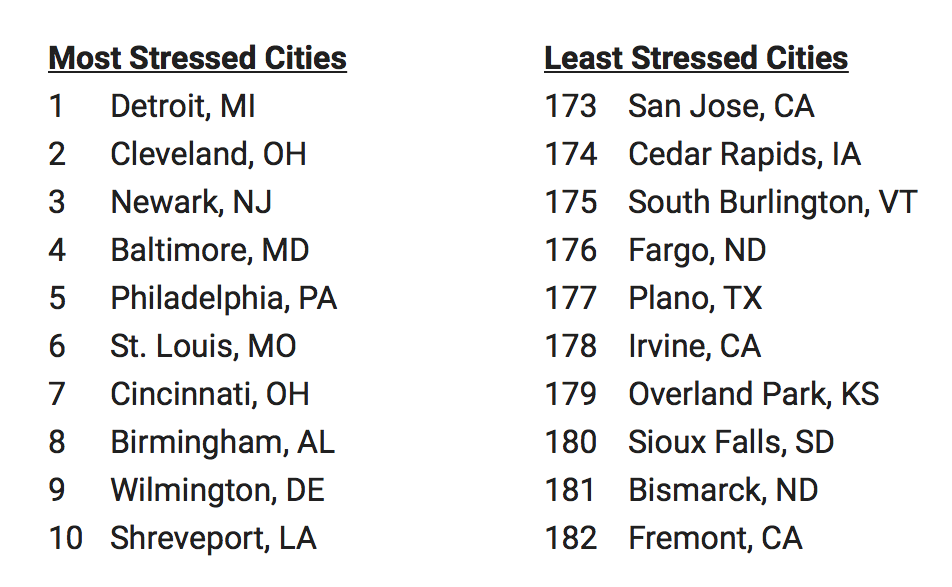With chronic stress affecting more than 100 million Americans, WalletHub released an in-depth study Monday, outlining the 180 most and least stressed cities in the nation across 39 metrics.
The investigation follows the statistic that workplace-related stress alone costs society more than $300 billion per year, according to the American Institute of Stress.
WATCH:
The WalletHub study, released Monday, covered work stress, financial stress, family stress and health and safety stress. Within these metrics are certain categories with specific weights graded on a 100-point scale.
The data set ranges from average weekly work hours to debt load to divorce and suicide rates.
Not surprisingly, money topped the list as the number one stress-factor in the nation.
In the twenty-first century, Americans are working longer and harder than ever, an average of 47 hours per week due to the demands of the modern workplace. U.S. workers clock in more hours on the job than any other industrial country, according to The American Institute of Stress.

Top 10 most and least stressed cities; WalletHub
Detroit, Michigan, ranked as the most stressed city in America. It has the highest poverty and unemployment rates, the second highest divorce rate and the lowest average hours of sleep per night. Detroit’s total score is a whopping 62.72 out of 100, according to the study.
Cleveland, Ohio, comes right behind Detroit. It has the highest divorce rate, the second highest crime rate and ranks first in overall financial stress.
Source: WalletHub.
Fremont, California, is the nation’s least stressed city. It has the lowest divorce rate at 10.22%. Overall, Fremont scored 29.19 out of 100.
South Burlington, Vermont, has the lowest unemployment rate, 1.70%, 5.3 times lower than in Detroit, where 9% of the population is unemployed. (RELATED: Americans Are Literally Bursting At The Belt. Here’s A List Of Our Fattest Cities).
The safest city is Santa Clarita, California, scoring the lowest crime rate. Memphis, Tenn. has the highest crime rate.
Burlington and South Burlington, Vermont, have the lowest share of adults in fair or poor health at 9.90%.
WalletHub interviewed experts on how employees can combat the inevitable stress in a working environment.
“First, they need to recognize and understand the types of stress inherent in the work being performed, as well as how to help employees recover from exposure to those types of stress,” Julie Ann Leifeld, the clinic director at Southern Connecticut State University, said.
“Second, management needs to develop a workplace culture in which holistic well-being is considered a strategy, not a privilege,”
All content created by the Daily Caller News Foundation, an independent and nonpartisan newswire service, is available without charge to any legitimate news publisher that can provide a large audience. All republished articles must include our logo, our reporter’s byline and their DCNF affiliation. For any questions about our guidelines or partnering with us, please contact licensing@dailycallernewsfoundation.org.


